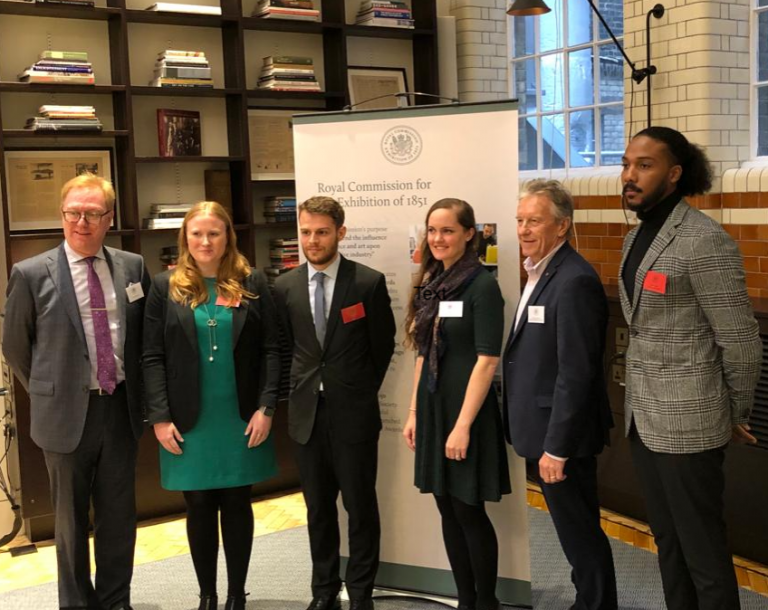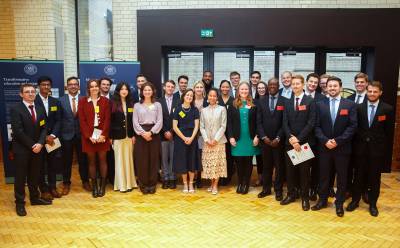PhD Student awarded prestigious Industrial Fellowship
6 October 2022

We are delighted to announce that doctoral student, Yohn Taylor, has been awarded one of the prestigious Industrial Fellowships by the Royal Commission for the Exhibition of 1851 for his project ‘Enhancing animal lung models to boost human drug trial pipeline’.
The aim of the industrial fellowship is to “encourage profitable innovation and creativity in British Industry.” Recipients of the £100k award are expected to make a considerable contribution to research for a British company, leading to a patent, product, or process improvement.
Yohn commented:
“I am extremely honoured to be a recipient of the 1851 Royal Commission Industrial Fellowship Award and I’m especially grateful to have had the guidance and mentorship of both my academic and industrial mentors. I hope to use this opportunity to make a difference both within the field of research and healthcare”
Yohn is an i4health CDT student jointly funded by the EPSRC and GlaxoSmithKline and starting his 3rd year. His project will initiate a new functional translational imaging framework for evaluating the development of novel treatments for lung-related illnesses. Preclinical to clinical translational evaluation of gas exchange utilising hyperpolarised 129Xe MRI is limited due to the intrinsic combination of compartmental (tissue/RBCs) 129Xe MR signals in mice. Yohn’s research will develop novel techniques permitting compartmental interrogation, primarily for the translational assessment of lung function within the drug development pipeline.
Yohn’s PhD supervisors also commented on this fantastic achievement:
“I am extremely excited Yohn has received this prestigious award. It is a fantastic opportunity for him to further develop his skills and extend his scientific connections; I am confident he will make the most out of this opportunity”
Dr Pilar Jimenez-Royo, Imaging Scientist, GlaxoSmithKline
“Yohn is the first PhD student that I have supervised who has been awarded a Royal Commission fellowship, and I am delighted for him. This gives Yohn a great opportunity to extend his scientific interactions and sets him up well for his future career”
Prof Geoff Parker, Professor of Healthcare Engineering, Imaging and Enterprise, UCL
About the Royal Commission for the Exhibition of 1851
The Royal Commission for the Exhibition of 1851 offers major awards to scientists and engineers for research, development and design. First established to stage the Great Exhibition in 1851, the Royal Commission's extraordinary history is founded on an inspired vision of the importance of education to economic success. It has previously funded luminaries such as Nobel laureates Professor Peter Higgs, Sir James Chadwick and Paul Dirac.
- More about the Industrial Fellowship
- £100k funding awarded to 10 young innovators to bring academia and industry together to tackle sustainability, medical and engineering challenges
- Projects selected include cleaner solutions for wastewater treatment, bio-inspired wound healing, improved energy storage in batteries, and foundations for personalised medicine
- Applications for the 2023 Industrial Fellowships are now open
London, 28September 2022 – Talented young innovators from across the United Kingdom have been awarded prestigious Industrial Fellowships by the Royal Commission for the Exhibition of 1851, to develop solutions to some of society’s biggest challenges, from clean water to effective medicines.
Set up by Prince Albert to organise the Great Exhibition of 1851 and extended in perpetuity to invest the profits in UK innovation, the Commission has been supporting promising research ever since. For 170 years it has provided crucial support to advance R&D and help to make UK industry more competitive internationally.
Through the Industrial Fellowships, the Commission links academic research with industrial scale to develop entirely new commercial products and services. Fellows conduct their doctoral research with a company in their chosen industry, and are supported to take a deeper dive into the research questions that matter most. This enables students to investigate new ways of thinking about traditional problems, and become leaders in their field. The programme also equips companies with cutting-edge research without the premium price tag and strengthens links between universities and commercial organisations.
This year’s Fellows will be focussed on a broad range of topics from environmentally conscious wastewater treatment, to maximising battery efficiency, and even intelligent wound targeting with drugs derived from the human body itself.
Industrial Fellowships provide funding of up to £100,000, covering salary contributions, university fees and costs for doctoral studies for up to 3 years of research. The output of such an investment is estimated at £2 million a year in intellectual property, developing crucial new technologies and scientific advances that advance research fields and British industrial players. During the Fellowship, students are provided with support from academic and industrial supervisors.
Bernard Taylor, Chairman of the Royal Commission for the Exhibition of 1851, said: “The Commission supports some of the most skilled and accomplished researchers across the UK to pursue cutting-edge projects and develop products and services with commercial applications. This research will create tangible impact on many of society’s most pressing issues.
The diversity of research projects being supported this year, in areas like biomedical science, 3D printing, and wastewater treatment, is testament to the ingenuity of young researchers across the country. Every new Fellow represents a stronger link between British industry and academia that has both economic and social benefits for all.”
The full list of 2022 Industrial Fellows are:
- Yohn Taylor, GSK and University College London: Enhancing animal lung models to boost human drug trial pipeline
- Aleksandra Nikoniuk, Autolus and University College London: “Lab-on-a-microchip” helps testing for new cancer treatment
- Finbar Gaffey, LifeArc and the University of Sheffield: Developing better models to understand the complexity of Motor Neurone Disease
- James Rowley, GSK and the University of Strathclyde: Establishing links between proteins and disease: Fluorescent binding of proteins lights the way to future therapies
- Jessica Crompton, GSK and the University of Oxford: Improving methods of making 3D molecules to create better medicines
- Joe Ross, Brill Power and the University of Oxford: Unlocking the future of energy storage for a sustainable tomorrow
- Joseph Counte, Sensor Coating Systems and the University of Nottingham: Accurately measuring extreme temperatures for better engineering
- Magdalene Ho, Convatec and Imperial College London: Smart wound healing through bio-inspired nanotechnology
- Matthew Diable, Polymer Mimetics and the University of Liverpool: 3D printing materials developed with built-in durability and biodegradability
- Nicholas Nyamayedenga, James Mae Group and the University of Bradford: Removing waste from waste-water treatment with better energy recycling
Applications for the 2023 Industrial Fellowships are now open. Visit the Commission website to learn more.
 Close
Close

